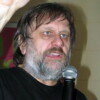Slavoj Zizek

Slavoj Zizek
Slavoj Žižek; born 21 March 1949) is a Slovenian psychoanalytic philosopher, cultural critic, and Hegelian Marxist. He is a senior researcher at the Institute for Sociology and Philosophy at the University of Ljubljana, Global Distinguished Professor of German at New York University, and international director of the Birkbeck Institute for the Humanities of the University of London. His work is located at the intersection of a range of subjects, including continental philosophy, political theory, cultural studies, psychoanalysis, film criticism, and...
ProfessionPhilosopher
Date of Birth21 March 1949
When authority is backed up by an immediate physical compulsion, what we are dealing with is not authority proper (i.e. symbolic authority), but simply an agency of brute force.
In a democracy, every ordinary citizen is effectively a king--but a king in a constitutional democracy, a monarch who decides only formally, whose function is merely to sign off on measures proposed by an executive administration. This is why the problem with democratic rituals is homologous to the great problem of constitutional monarchy: how to protect the dignity of the king? How to maintain the appearance that the king effectively makes decisions, when we all know this not to be true?
The more opera is dead, the more it flourishes.
I think that the task of philosophy is not to provide answers, but to show how the way we perceive a problem can be itself part of a problem.
What we philosophers can do is just correct the questions.
The ultimate goal of radical politics is gradually to displace the limit of social exclusions, empowering the excluded agents (sexual and ethnic minorities) by creating marginal spaces in which they can articulate and question their identity. Radical politics thus becomes an endless mocking parody and provocation, a gradual process of reidentification in which there are not final victories and ultimate demarcations
I almost stopped teaching entirely. The worst thing for me is contact with students. I like universities without students. And I especially hate American students. They think you owe them something. They come to you ... Office hours!
We need useless theory more than ever today.
This, then, is the truth of the discourse of universal human rights: the Wall separating those covered by the umbrella of Human Rights and those excluded from its protective cover. Any reference to universal human rights as an 'unfinished project' to be gradually extended to all people is here a vain ideological chimera - and, faced with this prospect, do we, in the West, have any right to condemn the excluded when they use any means, inclusive of terror, to fight their exclusion?
I - and I still consider myself, I'm sorry to tell you, a Marxist and a Communist, but I couldn't help noticing how all the best Marxist analyses are always analyses of a failure.
In the electoral campaign, President Bush named as the most important person in his life Jesus . Now he has a unique chance to prove that he meant it seriously: for him, as for all Americans today, "Love thy neighbor!" means "Love the Muslims!" OR IT MEANS NOTHING AT ALL.
But in a radically atheist universe, you are not only responsible for doing your duty, You are also responsible for deciding what is your duty.
Fascism is relatively easy to explain. It is a reactionary phenomenon. Nazism was some bad guys having some bad ideas and unfortunately succeeding in realizing them.
You can be an extreme materialist, thinking that economic development ultimately determines everything; then you are truly ideological.